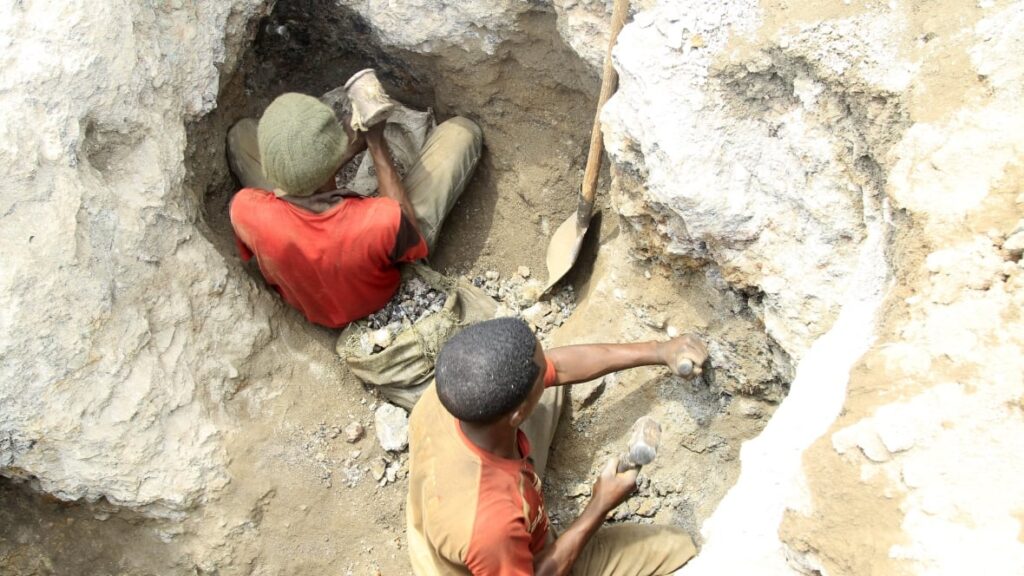
As per usual, we’re rushing into adopting new technologies without considering the true costs or ramifications. The explicit order, that which is intended and achieved, masks the presence of the implicit order, that which is unintended and remains hidden for a while. In the case of new green energy battery technology, the implicit order has grievously revealed itself.
The world’s greatest supply of cobalt, an element essential in the newest generations of batteries that fuel cell phones and electric vehicles, is found in the Congo in Africa, which reportedly contains 50% of the world’s cobalt. The Congo has long been known for its mineral wealth, and mining was a major activity while it was controlled by Belgium during the colonial era. Even after gaining its freedom, Belgium and the west successfully conspired to assassinate its leader Patrice Lumumba, replace him with a western-leaning dictator and control its cobalt mines.
Cobalt is a toxic element, extracted from ore which also often includes copper. It’s effects on human health include cardiomyopathy, cognitive dysfunction, hearing loss, neuropathy, and even cancer. Of Congo’s nineteen open pit cobalt mines, fourteen are owned by Chinese government supported companies who use massive earth moving and mining equipment. Open pit mines excavate and scar vast stretches of land, but also leave them open to poor Congolese families who, with picks and shovels, gather cobalt ore, sift it, wash it, and sell it to dealers who in turn sell it to the Chinese companies.
These subsistence miners, who include young children, make between one and five dollars per day. Covered in cobalt dust, they return home where all family members are then exposed to the toxin. The cruel facts of cobalt mining have long been known, but its essential role in the production of batteries for electronic devices continues to fuel a growing demand. Hundreds of thousands of poor Congolese people are being systematically poisoned in the name of progress.
The green revolution that is prompting the elimination of fossil fuels carries with it an unwillingness on the part of consumers to sacrifice their convenience and lifestyles. Electric vehicles are acceptable to us only if they deliver the same level of reliability, duration, and style as fossil fuel vehicles. We are perfectly willing to give up on one technology as long as its replacement asks no sacrifice from us in return. This moral failing is the soft underbelly of the green revolution, blind acceptance of the largely hidden and cruel costs new technologies inflict on some of the poorest people in the world.
Like most of us, I’m complicit. I just upgraded and replaced my iPhone, for example. In the sales process, no reference to cobalt mining came up or the role that companies like Apple play in the wholesale poisoning of the people of the Congo. We ignored it, as such is generally ignored as we go about buying the next great thing.
Our consumerist mindset is selfishly ecocidal. Stripping the planet of its minerals so we can satisfy our desire for yet more gadgets will not end well, particularly as huge populations of the poor pay for it with wretched lives. Simply replacing one technology with another does not solve the problem; each new technology brings with it a unique set of effects, many of them as destructive as those of the technology it replaces. Ultimately, we must learn to be satisfied with enough.
I had not heard the term “ecosidal” before, and it has truly stopped me in my tracks. This is a haunting truth, all too easy to ignore as you point out, as long as it is happening elsewhere and to someone else, and I am not inconvenienced. Are their alternatives?
Yeah, ecocide knocked me out too. As to alternatives, there might be, but these rare elements seem to be essential and they all require mining. There are also plans to mine the deep sea floor, where such minerals are found as nodules. It’s all quite horrifying, and all in the name of “progress.” Sigh.
Many of these rare earth elements are sitting in our own coal ash trash. If they can be mined without causing harm, that would be terrific. Not sure what that would entail, but the bottom line is – we all need to go back to living the way we did in the 1950s or 60s. Less STUFF, less tech, less travel, less flying, more home gardens, more repairing old shoes and clothes.
Great piece, Larry. I reposted this on Facebook today.
Tom